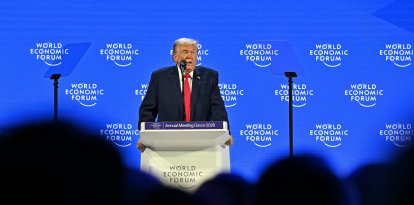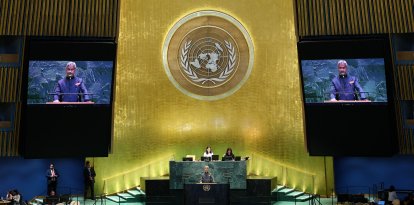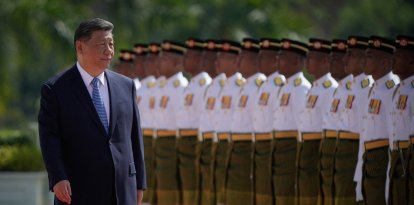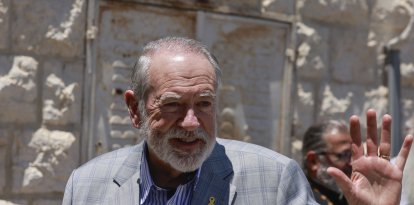In defense of Benjamin Netanyahu, a man from another time
Benjamin Netanyahu will one day be recognized for his economic reforms and his inexorable efforts to confront terrorism.

In this handout picture taken and released by the Israeli Prime Minister's Office on November 26, 2023 Israeli Prime Minister Benjamin Netanyahu (R) meets soldiers at undisclosed location in the Gaza Strip. - Netanyahu told soldiers in the Gaza Strip on November 26 that Israel's efforts would continue ""until victory"". (Photo by Handout / Israeli Prime Minister Office / AFP) / RESTRICTED TO EDITORIAL USE - MANDATORY CREDIT ""AFP PHOTO / ISRAELI PRIME MINISTER OFFICE"" - NO MARKETING NO ADVERTISING CAMPAIGNS - DISTRIBUTED AS A SERVICE TO CLIENTS - RESTRICTED TO EDITORIAL USE - MANDATORY CREDIT ""AFP PHOTO / ISRAELI PRIME MINISTER OFFICE"" - NO MARKETING NO ADVERTISING CAMPAIGNS - DISTRIBUTED AS A SERVICE TO CLIENTS /
When Benjamin Netanyahu entered his first government meeting after becoming prime minister, in 1996, he was dismayed by the lavish spread of the banquet that accompanied the discussions. The following week those who were dismayed were the ministers: there was no longer a banquet, but a much more modest display of breakfast. Times had changed.
Gestures like that rigidly describe the nature of Benjamin Netanyahu. Contrary to the general notion of how things are done, he had to put his foot down, step firmly and remain still. Precisely for this reason, the prime minister became the most influential man in modern Israel—largely because if people talk about Israel and modernity at the same time, it is thanks to him.
He came to power in the summer of 1996 with the desire to lift Israel out of the economic obsolescence in which it found itself. In his memoir, Netanyahu explains that, by then, Israel was more like third world countries than modern nations in its economic structure. Israel was, because it was conceived that way, a paternalistic, socialist, statist and controlling state.
Although Netanyahu considered himself a free market dogmatist, an ulterior motivation drove him to carry out the most important reforms that Israel has ever experienced: the prime minister knew that to survive, Israel needed a robust military force, ready to defend itself or attack. , according to the case. And, to build a first-class military apparatus, Israel had to be a prosperous nation.
By the mid-1990s, the Jewish State had a controlled economy, with a massive bureaucratic structure and rigid exchange control. Dismantling all that was at odds with the interests of the political class, regardless of the party. Ultimately, Israeli policy was based on this bureaucratic apparatus. Although many considered the turn, none dared for fear that good intentions would swallow them up. Netanyahu wanted to take a risk.
"One of my initial reforms was to fulfill the electoral promise of reducing the number of ministers to eighteen, with positions similar to the secretaries of the American Government," says Netanyahu in his memoirs.
"In my opinion, eighteen ministers was already an exaggerated number to lead a small country, in fact, any country, and I maintained that number during my three years in office," he writes.
Then, Netanyahu set out to privatize large state companies. It was his second major reform: the total privatized assets of his first Government reached $4.5 billion, much more than all the assets privatized during the almost 50 years of the Jewish State's existence.
One of the first privatizations was that of Hapoalim Bank, Israel's largest. In this regard, a friend of Netanyahu told him that "privatizing the Hapoalim bank in Israel is like opening a McDonald's in Red Square." And the then prime minister took that step as a sign of the future.
Together with the bank, Netanyahu privatized telecommunications, which now allowed a poor Israeli or a developing city to call a relative in New York or Los Angeles at an extremely low price, unlike what they paid when the State controlled the service. The same thing happened with transportation.
Finally, the third major reform of Netanyahu's first term was the liberalization of the currency. Being the largest, it involved additional efforts due to the reluctance of the political sectors to stop controlling the Israelis' pockets.
"In 1998 Israel was still like many third world countries when it came to currency. Israelis could not take more than $7,000 out of the country without special authorization from the Bank of Israel, the central bank. Upon returning from abroad, They had to redeposit and register all the foreign currency they had within the country," says Netanyahu.
Due to the restrictions, Israel had not been able to insert itself into the world market, which in the 1990s was as vibrant as it had ever been. Paradoxically, many of the big technology companies at that time were Israeli, but they could not have a presence in the Jewish State.
Netanyahu faced stiff opposition, even from his own party, to releasing the currency. He couldn't find a team to accompany him in what seemed like a leap into the void. "I was convinced that Israel simply could not advance towards the year 2000 without freeing its currency. Do you believe in free markets or not? I asked myself. If so, then go ahead. I decided to take a risk," he says.
Because of the reforms, plus substantial funding support for the country's scientific education, Israel achieved impressive numbers by the end of Benjamin Netanyahu's term: foreign investments reached $25 billion; the number of high-tech startups reached an average of one thousand a year; and the deficit was reduced by more than $4 billion.
These changes inserted Israel into modernity. Netanyahu later deepened them, when Ariel Sharon appointed him Minister of Finance, between 2003 and 2005. From them emerges the concept of the start-up nation and the modern country, the world's vanguard in technology. But the other axis that Netanyahu considered of his Government was missing: the military wing.
Today, Benjamin Netayahu, regarding the war in Gaza and the domestic protests, receives adverse attention from the press and world public opinion. The governments and the left-wing media have constructed the rather unfair story of Netanyahu's supposed ruinous and warmongering affinity.
Netanyahu set the defense of Israel as a priority and, being the prime minister who has governed the longest in the history of Israel - and, therefore, who has faced numerous security crises -, he has achieved it, with his grays.
Part of this defense involves preventing Iran, Israel's greatest enemy, from developing nuclear weapons. That has been one of Netanyahu's great causes and what led him, despite his reputation as a warmonger, to achieve peace with almost all Arab nations, including Saudi Arabia—peace interrupted by the invasion and massacre perpetrated by Hamas last year. October 7.
Netanyahu turned Israel into a modern nation and then turned it into a world power. Today, the country is one of the twelve most powerful in the world; and hence the secret of its survival.
As an example of the latter, still in a premature state since by the end of the nineties Israel was not the technological power of today but Netanyahu's influence was already weighing, there is this anecdote that he tells in his memoirs:
"Although Israel's full rise on the world stage would only be visible later (...) we received an early message of recognition of the country's power from an unexpected source. In early January 1998, Saddam Hussein imposed limitations on United Nations inspectors charged with overseeing a possible revival of the Iraqi nuclear program. Tensions between the United States and Iraq escalated, leading to fears that Saddam would attack Israel again in retaliation for US military action. I ordered the military to adopt defense and attack measures in case such a contingency occurred. At the end of January, the Russian deputy foreign minister came to see me with a message from the Iraqi dictator. 'Saddam has asked me to let you know that he has no plans to attack Israel,' he said. I returned a scathing response: 'Tell him that's very wise of him.'"
Today, in Gaza, with all the implications and collateral damage of a war—especially when the enemy takes advantage of the tactic of using civilians as shields—Netanyahu is defending Israel's interests. The response, no matter how blunt and implacable it may seem, is proportional to the largest massacre committed against the Jews since the Holocaust. The life of an Israeli child is worth it.
I often compare Benjamin Netanyahu's leadership with that of Álvaro Uribe in Colombia. Although the gap seems long, the political histories of Netanyahu and Uribe are quite similar. Both statesmen reintegrated their countries into the world after standing firmly and ruthlessly in the face of terrorism. The security of their country was the main focus of their governments, and both received (and receive) unforgiving and hostile treatment from public opinion.
Uribe, like Netanyahu, left a prosperous and safe country. And Uribe, like Netanyahu, is accused of the same thing, only for defending Colombians and imposing, with bullets if necessary, justice. But the treatment, although undeserved, will dissipate, probably under the weight of the facts, as is already beginning to happen in Colombia.
In the end, men who are not of their time are not recognized when appropriate but later. Benjamin Netanyahu, with the market economy reforms, with his stubbornness to turn Israel into a modern nation and his inexorable determination to confront terrorism will be recognized when Israel falls into the hands of its enemies - eager to seize power, leveraged on the hate and slander. Then Israelis (and the world) will long for the greatness of a government that had to do the unpopular thing because it was the right thing to do.

























